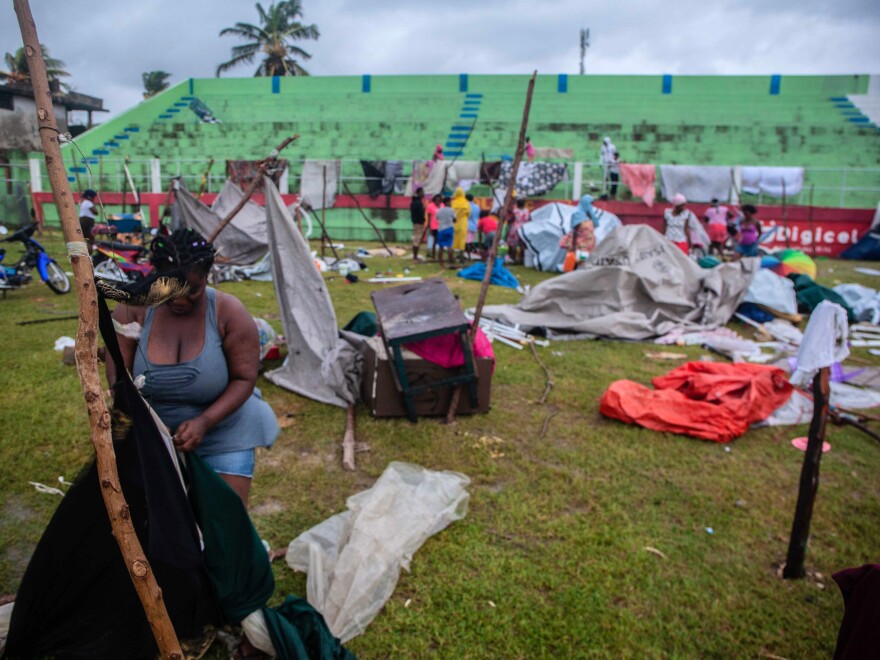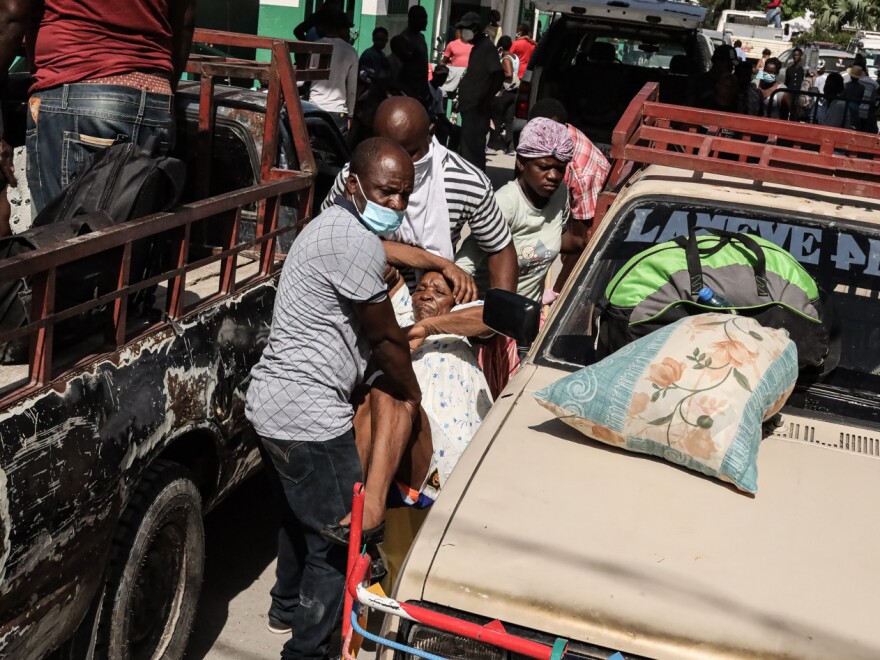When news of the 7.2 magnitude earthquake that struck Haiti over the weekend reached Marleine Bastien, she asked herself two questions.
"I was numb. I was angry, asking, 'Why Haiti can't get a break? How are we to cope with so many disasters piling on each other?' " she recalled.
Bastien runs the Family Action Network Movement, an organization based in the Little Haiti neighborhood of Miami that provides educational, health and other services to low-income and marginalized communities.
"I went through a myriad of emotions," she said. "Then the idea came that, you know, this happened. There is an earthquake. And people need help."
Bastien called an emergency meeting with over 40 stakeholders, including people from Haiti and Jamaica, to map out a plan to deliver aid to those impacted by the earthquake. That included beginning to search for trusted groups that could deliver aid directly to the Haitian people. Her organization also started collecting money for the recovery effort as well as items that are in short supply on the ground in Haiti, such as medical equipment and over-the-counter medication.
"[Haiti] needs help that will not destroy. It needs help that will nourish, you know, and then help the country thrive," she said.
As eager as Haitian Americans and Haitians in the diaspora may be to marshal resources for those suffering in the Caribbean nation, it seems almost impossible to keep up with the pace of disasters befalling Haiti. Some people have developed what they call "Haiti fatigue," a loss of compassion in response to the mounting crises.
But for others who are literally fatigued from the constant churn of Haiti relief efforts, the work never stops — not even when one recovery effort is interrupted by another catastrophe.

"There's really no room — or really no time — to address fatigue right now, because there's so much to be done and people need so much. You're talking about people who are still under the rubble, people who are still sleeping in the streets since Saturday," said Elsie Saint-Louis, executive director of Haitian-Americans United for Progress, based in New York City.
"The country needs us. It's our home. We're going to do what we've got to do to support the people who are there," she added.
Disaster after disaster has pummeled Haiti
Talk to enough people about this island nation, and you'll hear a common refrain: Why can't Haiti catch a break?
For one, it is among the most vulnerable areas in the world to climate change.
In 2010, an earthquake rocked the nation, killing 220,000 people and displacing 1.5 million. The earthquake recovery effort had its own problems: Hundreds of millions of aid dollars went unaccounted for, and at least 10,000 people in Haiti died from cholera that was brought into the country by aid workers.
Later, in 2016, Hurricane Matthew clobbered the country, killing 600 people and displacing tens of thousands of residents.
Haiti also suffers from chronic political instability. In recent years, Haiti saw massive political protests against then-President Jovenel Moïse, an unchecked crime wave and a sluggish response to the COVID-19 pandemic. Then, in July, Moïse was killed by gunmen in the presidential palace in an assassination that remains under investigation.

A devastating quake was just the latest
On Saturday, tragedy struck again. The earthquake that hit the southwestern part of the country injured more than 12,000 and killed more than 2,000, a number that officials say they expect will rise. Complicating rescue efforts this week, Tropical Storm Grace passed through the area.
"The fatigue is mostly just the emotional beating that we're taking, because it's been disaster after disaster after disaster," said Macollvie Neel, managing editor of the New York-based Haitian Times.
In the case of the earthquake, Neel said, one disaster is compounding another. A new Haitian government that is just getting off the ground after Moïse's assassination must now confront a major natural disaster — an overwhelming task for any administration.
Haitian Americans can't afford to despair
But Neel said she did not sense hopelessness among Haitians or those attempting to help from the United States.
"I don't believe there's any thought to not caring or giving up on Haiti. Not at all," Neel said. "I think what this is doing is making people think about how to be prepared for crises like this that are successive in the long term."
Instead of causing Haitians and Haitian Americans to throw up their hands, she said, the series of crises may have had the opposite effect: nudging them to think about the future of the country.

To them, it's a time to mobilize
According to Bastien, who grew up in Haiti, the country is still recovering from the 2010 earthquake, the cholera epidemic and Hurricane Matthew.
Now it needs assistance from beyond its borders again.
"There is definitely Haiti fatigue. And I can see that. I can feel that," she noted.
But Bastien said seeing images on the news of Haitians helping each other in the hours and days after the earthquake, digging through broken concrete to pull out a loved one or a complete stranger, has inspired her.
"You say, 'You know what, who am I now to just give up and crumble to hopelessness? Who am I to do that?' Look at what they're going through. They don't have access to food. They don't have access to potable water. They don't have access to the bare minimum. And yet," she said.
Saint-Louis echoed that sentiment, urging people not to discount the nation of 11 million people.
"There's a lot of failed institutions, but Haiti is still Haiti. It's a beautiful country with beautiful people with beautiful souls who want to do so much," she said.
"It's not the time to give up on the country. It's the time to really rally behind the country and support Haitians, support Haiti, and bring the country out of the rut that it is in."
Here's how you can support relief efforts in Haiti.
Copyright 2021 NPR. To see more, visit https://www.npr.org.




